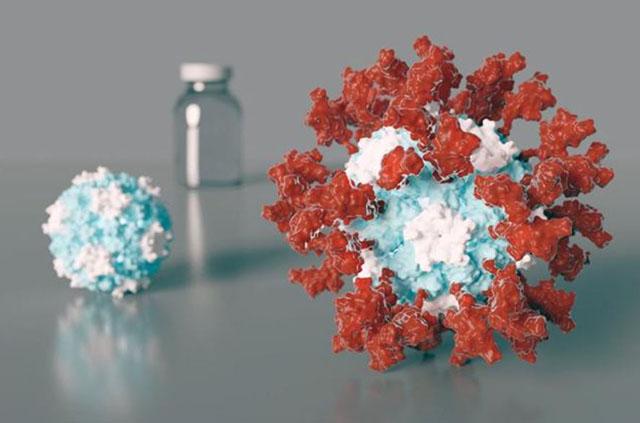An image of the nanoparticle with spike proteins used in a newly developed COVID-19 vaccine candidate. (Ian Haydon / UW Institute for Protein Design)
A project to test what is known as an ultrapotent second-generation COVID-19 vaccine candidate will receive up to $ 173.4 million to conduct Phase 3 clinical trials. The vaccine was developed in collaboration between the Institute for Protein Design at the University of Washington and SK Bioscience, based in South Korea.
The vaccine, called GPB510, uses nanoparticle technology that was developed at the UW Institute. The vaccine uses a nanoparticle scaffold occupied by 60 copies of a key region of the virus spike protein. The design mimics the shape of the coronavirus. In preclinical research published in the leading journals Cell and Nature, the vaccine elicited strong and sustained immune responses.
Researchers worked to develop a vaccine that is safe and effective at low doses, easy to manufacture, and stable with no need for storage at extremely low temperatures.
Neil King, Associate Professor at UW who was recently a finalist for 2021 Innovation of the GeekWire Awards, led the research in Seattle.
SK Bioscience will conduct the multinational clinical studies. The newly announced funding comes from the Coalition for Epidemic Preparedness Innovations (CEPI). The money will help fund clinical trials and grow SK Bioscience’s vaccine manufacturing, with the goal of producing hundreds of millions of doses annually. The funds will also support research into new worrisome variants of coronavirus.
SK Bioscience previously received support from the Bill & Melinda Gates Foundation and CEPI, a global partnership in support of vaccine development to combat pandemics. CEPI is also a co-leader of COVAX, an international company committed to the equitable distribution of COVID vaccines around the world. If the GPB510 passes the screening, it will be made available to COVAX for distribution.
King, a biochemist, is also the co-founder and chairman of the scientific advisory board for UW spinout Icosavax. The Seattle startup is working on vaccines against COVID and less common diseases using nanoparticle technology invented by King.
Other leading researchers in the development of GPB510 include numerous employees and UW researchers Alexandra Walls, Brooke Fiala and David Veesler.
